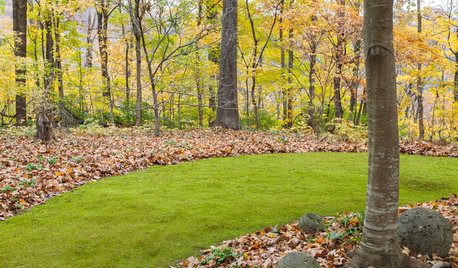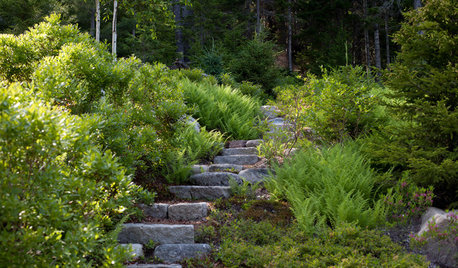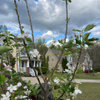In another recent thread on this forum, it was mentioned that farmers use ammonium sulfate with their glyphosate applications. I have "cut and copied" the following from the internet to explain why this is a good idea for those of you that use Round-Up type products:
This is the second edition of the Nursery Weeds List. I received a call last week from a grower wanting to know whether or not to add ammonium sulfate to his Roundup spray. Should you do such a thing? We talked for a bit, and I thought it was such a good question that I wanted to share with you some of the things we discussed.
Can you add ammonium sulfate (AS) to Roundup? Yes, the label allows you to add up to 17 lb. AS to a 100 gallon spray tank. The label also correctly warns that adding AS does not preclude you from using the proper surfactant. So you are legally allowed, but should you? Does it make any difference in the level of control?
Yes it does, under two situations. But first let's clear a few things up.
Roundup uses the active ingredient glyphosate. Different formulations of Roundup (and mimics from other companies) utilize different surfactants and other additives, but in every case it is glyphosate doing the dirty work. Glyphosate kills plants by binding to an enzyme called EPSP synthase. This prevents the normal functioning of the enzyme, and when the enzyme is blocked, the plant cannot form 3 critical amino acids and soon dies.
'Hard water' is water with high levels of calcium (Ca), magnesium (Mg), and/or sodium (Na). Other cations can cause hard water, but these are the usual suspects.
Hard water in the spray tank will reduce Roundup effectiveness. But adding AS alleviates problems caused by hard water. To determine how hard your water is, have it analyzed by a laboratory. There are many in the Willamette Valley, contact your local extension (or me) if you need to find one. When you get your results, use the following equation developed by North Dakota State University to determine how much AS to add to the spray tank.
AS (lbs./100 gal) = 0.005*ppm Na + 0.002*ppm K + 0.009*ppm Ca + 0.014*ppm Mg
So, why does hard water interfere with Roundup? Ca, Mg, or Na can form a complex with the glyphosate molecule. When this happens, the molecule is rendered ineffective in the plant because the glyphosate molecule is unable to bind to EPSP synthase. Therefore, the ability of Roundup to kill plants is reduced when hard water is used. When adding AS, the ammonium preferentially attaches itself to the glyphosate molecule and thus prevents Ca, Mg, and Na from doing so. When ammonium is attached, the molecule can function normally, thus the effects of hard water are neutralized by adding AS.
Let's suppose your water is NOT hard. Is there still a reason to add AS to the spray tank? Yes again, but only in some situations. Some plants contain high levels of Ca in their intracellular spaces. Just like hard water in a spray tank, high Ca levels between plant cells can reduce Roundup effectiveness.
Some plants have natural defense mechanisms for reducing Roundup effectiveness. Upon misting the leaf surface of velvetleaf (Abutilon theophrasti), the plant will release Ca from within the leaf onto the leaf surface! (Hall et al., 1999) Nobody knows why this happens, but the effect is the same, Ca interferes with the ability of the glyphosate molecule to function properly inside the cell. Again, adding AS to the spray tank alleviates this physiologically-induced Ca interference.
Velvetleaf, lambsquarter, and a few other weeds have specialized thrichomes (hairs) called chalk glands on the leaf surface. These are a source of Ca and other cations, which will interfere with Roundup if AS is not added.
Adding AS (assuming water is NOT hard) only improves effectiveness against plants that have elevated Ca levels described above. For plants with inherently low levels of Ca, adding AS has no noticeable effect. Velvet leaf is the plant most notably affected by adding AS. Velvetleaf is not common in the Willamette Valley (although some have reported an increasing population of this weed). Another plant in which control is also improved, and one that is a HUGE problem in the Willamette Valley, is quackgrass (Agropyron repens).
Most weeds have not been tested for their response to Roundup + AS, so I can't provide many details on specific weeds. It will improve control for some, not for others (again, assuming hard water is not an issue).
Common lambsquarter (Chenopodium album) is a common weed in Willamette Valley nurseries.
This close-up picture of a lambsquarter seedling vividly shows the chalk glands that could interfere with Roundup effectiveness.
If hard water is an issue in your nursery, AS will improve control when using Roundup.
If you're not sure, AS is pretty cheap, and might be a good insurance policy.
Take care, and we'll talk again in about 2 weeks,
James Altland
OSU/NWREC









Michael
northernmnOriginal Author
Related Discussions
How to use Ammonium Sulfate on blueberries
Q
Ammonium sulfate ?
Q
Calculating mixing rate of ammonium sulfate for blueberries
Q
ammonium sulfate
Q
ericwi
Michael